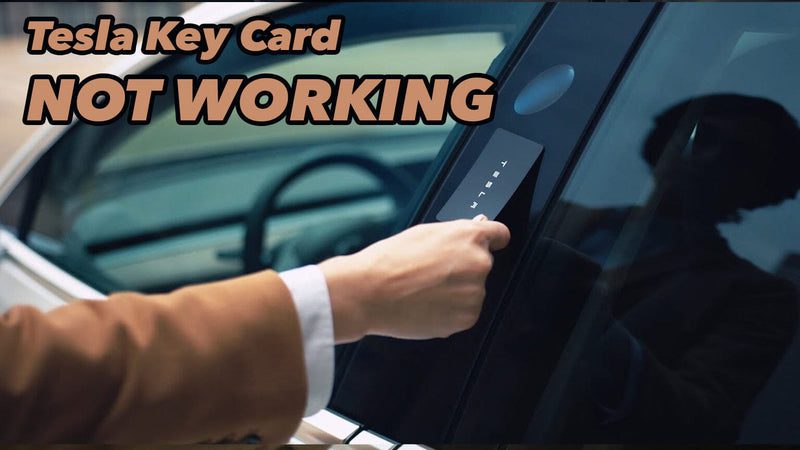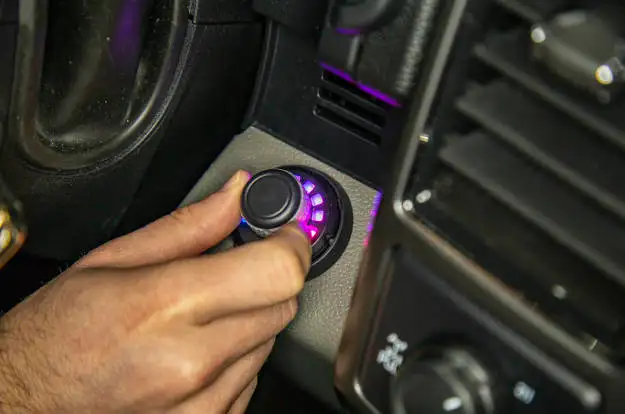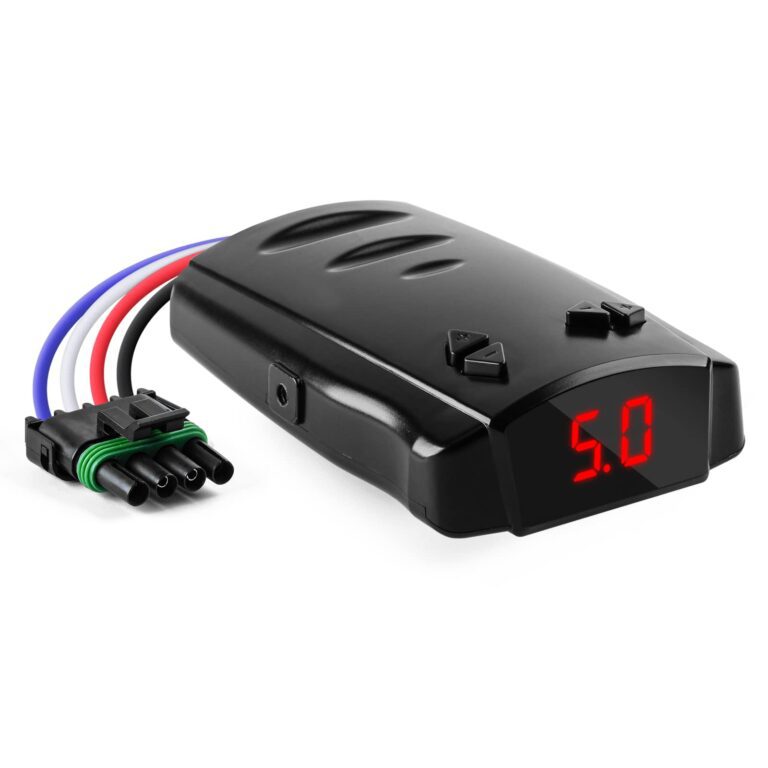Troubleshooting Trailer Brake Controller Problems: A Comprehensive Guide
The process of diagnosing system issues with a trailer brake controller involves checking for loose connections, testing electrical connections and fuses, and inspecting the brake controller display for error codes. When troubleshooting, it’s important to ensure all connections are secure, including the trailer connection, battery connection, and ground connection.
Testing electrical connections and fuses can help identify any damaged or malfunctioning components. Finally, checking the brake controller display for error codes can provide valuable information about any system issues that may be present. By following these steps, one can effectively diagnose and resolve system issues with a trailer brake controller.
Diagnosing system issues with a trailer brake controller is essential for ensuring safe and efficient towing. When the brake controller malfunctions, it can compromise the braking performance of the trailer, posing a risk to both the vehicle and its occupants. To address these concerns, it is crucial to understand the diagnostic process involved in resolving system issues. This article will provide a comprehensive guide to diagnosing system issues with a trailer brake controller, outlining the necessary steps to identify and rectify any problems. By following these guidelines, trailer owners can ensure the safety and reliability of their towing experience.

Credit: www.youtube.com
Understanding The Basics Of Trailer Brake Controllers
The Role Of A Brake Controller In A Trailer Braking System
A brake controller plays a crucial role in ensuring the safety and functionality of a trailer’s braking system. It is responsible for controlling the electric or hydraulic brakes installed on the trailer, allowing the driver to apply the brakes and stop the trailer smoothly.
Here are some key points to understand about the role of a brake controller:
- The brake controller acts as a link between the towing vehicle and the trailer brakes, transmitting electrical or hydraulic signals to activate the brakes when the towing vehicle’s brakes are applied.
- It helps maintain the stability of the trailer by distributing the braking force evenly among all wheels, reducing the risk of skidding or swaying.
- A brake controller also allows the driver to adjust the braking intensity based on the load or road conditions, providing greater control and responsiveness.
- In emergency situations, the brake controller can activate the trailer brakes independently of the towing vehicle, enhancing overall braking performance and reducing stopping distances.
Different Types Of Trailer Brake Controllers And Their Functionality
There are several types of trailer brake controllers available in the market, each with its own functionality and features. Understanding the different types can help you choose the right controller for your trailer. Here are the key points to consider:
- Time-delayed brake controllers:
- These controllers provide a preset time delay between the application of the towing vehicle’s brakes and the activation of the trailer brakes.
- They are suitable for trailers with consistent loads and do not require advanced braking features.
- Time-delayed controllers offer simplicity and affordability, making them a popular choice for many trailer owners.
- Proportional brake controllers:
- Proportional controllers are more advanced and offer a seamless braking experience by sensing the deceleration of the towing vehicle and delivering corresponding braking force to the trailer.
- They provide a proportional response, delivering the right amount of braking power based on the vehicle’s deceleration rate.
- Proportional brake controllers offer improved braking control and reduce wear and tear on the trailer’s brakes, resulting in smoother stops and overall extended brake life.
- Hydraulic brake controllers:
- Designed specifically for trailers with hydraulic brakes, these controllers use hydraulic pressure from the towing vehicle’s braking system to activate the trailer brakes.
- They offer precise control and responsiveness, making them ideal for trailers that require instantaneous braking action.
- Hydraulic brake controllers are often chosen for heavy-duty trailers or those involved in commercial applications.
- Brake controllers with integrated trailer sway control:
- Some brake controllers come with integrated trailer sway control functionality, which helps to minimize trailer sway or fishtailing.
- These controllers use sensors to detect any trailer sway, and they apply the trailer brakes selectively to bring the vehicle back under control.
- Trailer sway control enhances safety and stability, especially in situations where crosswinds or sudden maneuvers can lead to trailer instability.
Having a good understanding of the different types and functionalities of trailer brake controllers is essential for maintaining a safe and effective trailer braking system. By selecting the right brake controller to match your trailer’s needs, you can ensure reliable and responsive braking performance while towing.
Signs Of Trailer Brake Controller Problems
Recognizing Common Symptoms Of Brake Controller Issues
If you own a trailer and have a brake controller installed, it’s important to keep an eye out for potential problems. Ignoring signs of brake controller issues can lead to dangerous situations on the road and expensive repair bills down the line.
Here are some common symptoms that may indicate problems with your trailer brake controller:
- Brake delay: The brakes on your trailer may not engage immediately or may have a noticeable delay when you press the brake pedal. This can lead to accidents or difficulty stopping your trailer in time.
- Uneven braking: If your trailer pulls to one side when you apply the brakes, it may be a sign of an issue with the brake controller. Uneven braking can cause instability and make towing more challenging.
- Excessive braking: On the other hand, if your trailer brakes are engaging too forcefully, it can cause severe jerking or abrupt stops. This can be dangerous and may indicate a malfunctioning brake controller.
- Inconsistent braking: If you notice that the braking power of your trailer varies from one instance to another, it could be a sign of a malfunctioning brake controller. Inconsistent braking can make it difficult to predict and control the stopping distance of your trailer.
- Warning lights or error messages: Many modern brake controllers have built-in monitoring systems that can alert you to any issues. Pay attention to any warning lights or error messages on your brake controller display, as they can provide valuable information about potential problems.
How To Identify Potential Problems Before They Worsen
It’s crucial to catch brake controller issues early on before they worsen and lead to more significant problems. By regularly inspecting and monitoring your brake controller, you can take proactive measures to address any potential issues. Here’s what you can do to identify potential brake controller problems:
- Regular visual inspection: Take a close look at your brake controller to ensure that all connections are secure and free of corrosion. Look for any obvious signs of damage or wear, such as frayed wires or loose components.
- Check brake controller functions: Test the functionality of your brake controller periodically to ensure it’s working properly. Activate the manual override to see if the brakes engage smoothly and at the appropriate intensity. If there are any delays or inconsistencies, it may indicate a problem.
- Monitor braking performance: Pay attention to how your trailer brakes behave during towing. If you notice any changes in braking responsiveness, uneven braking, or other irregularities, it’s worth investigating further.
- Regular maintenance: Follow the manufacturer’s recommended maintenance schedule for your brake controller. This may include cleaning, adjusting, or replacing certain components to ensure optimal performance.
- Seek professional help: If you’re unsure about the condition of your brake controller or if you’ve identified any concerning symptoms, don’t hesitate to seek the assistance of a qualified professional. They can diagnose the issue accurately and make any necessary repairs or replacements.
Being vigilant and attentive to signs of brake controller issues is crucial for the safe operation of your trailer. By recognizing common symptoms and taking proactive measures, you can address potential problems before they worsen and ensure a smooth towing experience.
Remember, your safety and the safety of others on the road should always be a top priority.
Troubleshooting Steps For Trailer Brake Controller Problems
Diagnosing issues with your trailer brake controller can be frustrating, but with the right troubleshooting steps, you can quickly identify and resolve the problems. Whether you are experiencing power supply issues, brake response problems, or faulty electrical connections, following these steps will help you get your trailer brake system back in top shape.
Step 1: Checking The Power Source
To ensure proper power supply to the brake controller, follow these steps:
- Inspect the battery and wiring connections: Check for loose or corroded connections. Make sure the battery is fully charged and there are no signs of damage on the wiring.
Step 2: Testing The Brake Controller Output
To test the brake controller output, consider the following:
- Adjusting the brake controller settings: Consult the user manual to adjust the brake controller to the appropriate settings for your trailer and vehicle setup.
- Evaluating brake response and adjusting sensitivity: Take your vehicle for a test drive and observe the braking performance. If the brakes engage too aggressively or too weakly, adjust the sensitivity accordingly.
Step 3: Inspecting The Trailer Brake System
To ensure the trailer brake system is functioning properly, perform the following inspections:
- Checking the trailer brakes for wear and tear: Inspect the brake pads and linings for excessive wear. Replace any worn-out components.
- Assessing brake drums, shoes, and magnets for damage: Inspect the brake drums for any signs of cracks or warping. Check the shoes and magnets for wear or damage.
Step 4: Verifying The Electrical Connections
To confirm the integrity of the electrical connections, consider the following:
- Test the connection between the brake controller and trailer: Check if the connector is secure and free from dirt or corrosion.
- Checking for loose or damaged wiring: Inspect the wiring harness for any loose connections or frayed wires. Repair or replace as necessary.
Step 5: Diagnostic Tools For Advanced Troubleshooting
For more advanced troubleshooting, consider utilizing diagnostic tools:
- Utilizing diagnostic tools to pinpoint specific issues: Invest in a diagnostic tool specifically designed for trailer brake systems to accurately identify any underlying problems.
- Common diagnostic tests for brake controller problems: Conduct tests such as voltage measurements and circuit testing to pinpoint the root cause of the issue.
By following these troubleshooting steps, you can diagnose and resolve common issues with your trailer brake controller. Remember to consult the user manual for specific instructions and always prioritize safety while working on your trailer brake system.
Resolving Common Trailer Brake Controller Problems
Trailer brake controllers are essential components in towing systems, ensuring smooth and controlled braking for trailers. However, like any electronic device, they can encounter issues that require troubleshooting and resolution. In this section, we will explore some common problems that you may encounter with your trailer brake controller and provide potential solutions.
Issue 1: Brake Controller Not Responding
If your brake controller fails to respond when you activate the brakes in your tow vehicle, it can be quite frustrating. Here are some troubleshooting steps to help you get to the bottom of the issue:
- Check the power source: Ensure that your brake controller is receiving power. Check the wiring connections, fuses, and breakers to identify any potential issues.
- Verify brake pedal signal: Make sure that the signal from your brake pedal is reaching the brake controller. Faulty connections or wiring can disrupt this communication.
- Test manual override: Try activating the manual override on your brake controller and observe if the brakes respond. If they do, it suggests an issue with the brake pedal signal or the brake light switch.
Issue 2: Uneven Braking Or Poor Stopping Power
Uneven braking or a lack of stopping power can compromise the safety and control of your trailer. Here are some steps you can take to address this problem:
- Check trailer brake adjustment: Ensure that the brakes on your trailer are properly adjusted. Too tight or too loose brakes can lead to uneven braking performance.
- Verify brake system compatibility: Confirm that your tow vehicle’s braking system is compatible with your trailer’s brake controller. Incompatible systems can cause imbalances.
- Inspect brake components: Regularly inspect the brake pads, calipers, and rotors for any signs of wear or damage. Replace any worn-out components to maintain optimal braking performance.
Issue 3: Trailer Brakes Locking Up Or Not Engaging
When your trailer brakes lock up or fail to engage, it can pose a safety risk and impact your ability to control your trailer. Follow these steps to troubleshoot and resolve the issue:
- Check brake adjustment: Ensure that your trailer brakes are properly adjusted. Overly tight brakes can cause them to lock up and not release properly.
- Inspect brake wiring and connections: Faulty wiring or loose connections can disrupt the signal between the brake controller and trailer brakes, causing them to malfunction.
- Test brake magnet functionality: The brake magnets on your trailer are responsible for engaging the brakes. Verify that these magnets are functioning correctly and replace any faulty ones.
Issue 4: Brake Controller Error Codes And Messages
Modern brake controllers often display error codes or messages to indicate specific issues. Understanding and addressing these codes can help you resolve problems effectively. Here are some common error codes and their possible solutions:
- E1 or e2: These codes usually indicate issues with the brake connection or the brake controller’s power source. Check the wiring and power supply to address the problem.
- E3 or e4: These codes typically indicate short circuit or electrical overload issues. Inspect the wiring for any signs of damage or short circuits and repair or replace as necessary.
- Lb or no c: These codes suggest a loss of communication between the brake controller and the trailer. Check the wiring and connections to restore the communication.
By following these troubleshooting steps and implementing the suggested solutions, you can address common issues with your trailer brake controller and enjoy safer and more efficient towing experiences. Remember to prioritize regular maintenance and inspections to catch any potential problems early on.
Preventive Maintenance For Trailer Brake Controllers
Importance Of Regular Maintenance For Brake Controllers
Regular maintenance is essential for keeping trailer brake controllers in good working condition. Neglecting maintenance can lead to various system issues and compromise the safety and performance of your trailer brakes. Here are some key points to understand the importance of regular brake controller maintenance:
- Ensures optimum brake performance: Regular maintenance helps detect any potential issues with the brake controller, allowing for timely repairs and adjustments. This ensures that the controller can efficiently control the trailer brakes and provide reliable stopping power when needed.
- Extends the lifespan of the brake controller: By regularly inspecting and maintaining the brake controller, you can identify and address any wear and tear early on. This helps prevent major failures or breakdowns and prolongs the lifespan of the controller.
- Promotes safer towing experiences: A properly maintained brake controller enhances the safety of your towing experiences. It ensures that the trailer brakes respond appropriately to braking inputs, preventing accidents and reducing the risk of trailer sway or jackknifing.
- Compliance with legal requirements: In many regions, trailers exceeding a certain weight threshold must have functioning brakes installed. Regular maintenance of the brake controller helps ensure compliance with these legal requirements, preventing potential fines or penalties.
Tips For Maintaining And Prolonging The Lifespan Of Brake Controllers
To maximize the lifespan of your brake controller and keep it functioning smoothly, implementing regular maintenance practices is crucial. Here are some helpful tips to follow:
- Visual inspection: Regularly inspect the brake controller for any visible signs of damage, such as frayed wires, loose connections, or corrosion. Address any issues promptly to prevent further damage.
- Cleanliness: Keep the brake controller and its surrounding area clean, especially from dirt, dust, or debris that may affect its performance. Use a soft cloth or compressed air to remove any particles.
- Testing and calibration: Periodically test the brake controller to ensure it is functioning correctly. Follow the manufacturer’s instructions on testing procedures and consider getting it professionally calibrated if necessary.
- Regular brake checks: Regularly inspect and maintain the trailer brakes themselves, including brake pads, rotors, and drums. Properly adjusted and well-maintained trailer brakes work in tandem with the controller to provide optimal braking performance.
- Lubrication: Lubricate any moving parts or mechanisms in the brake controller as recommended by the manufacturer. This helps prevent excessive wear and ensures smooth operation.
- Protection from moisture: Protect the brake controller from moisture, as water can damage electrical components and cause malfunctions. Store the trailer in a dry area and consider using protective covers when not in use.
By following these preventive maintenance tips, you can keep your trailer brake controller in top condition, ensuring safe and efficient towing experiences for years to come. Remember, regular maintenance not only protects your investment but also promotes safety on the road.
Frequently Asked Questions Of Diagnosing System Issues Of Trailer Brake Controller
How Do I Identify Issues With My Trailer Brake Controller?
To identify issues with your trailer brake controller, look out for warning lights, abnormal braking behavior, and conduct regular inspections and maintenance.
What Are Common Signs Of A Faulty Trailer Brake Controller?
Common signs of a faulty trailer brake controller include loss of braking power, uneven braking, delayed braking response, and warning lights on the dashboard.
How Can I Troubleshoot A Malfunctioning Trailer Brake Controller?
To troubleshoot a malfunctioning trailer brake controller, check the electrical connections, test the brake controller with a multimeter, inspect the brake system, and consult the user manual.
Why Do I Experience Trailer Brake Controller Errors During Towing?
Errors with a trailer brake controller during towing can occur due to loose connections, improper installation, faulty wiring, low battery voltage, or issues with the accompanying trailer brakes.
Can I Fix Trailer Brake Controller Issues On My Own?
Some minor issues with a trailer brake controller can be resolved by yourself, but major problems may require professional assistance for proper diagnosis and repair.
How Often Should I Inspect And Maintain My Trailer Brake Controller?
Regular inspections and maintenance of your trailer brake controller should be done at least once a year or as recommended by the manufacturer to ensure optimal performance and safety.
Where Can I Find A Reliable Mechanic To Repair My Trailer Brake Controller?
To find a reliable mechanic for trailer brake controller repairs, check online directories, ask for recommendations from fellow rv or trailer owners, or consult local automotive service centers.
Conclusion
To troubleshoot and diagnose system issues with your trailer brake controller, you must have a firm grasp on how it functions and the various potential problems that can arise. By understanding the common symptoms and causes, you can effectively identify and resolve any issues that may be affecting your controller’s performance.
Start by checking for loose or damaged connections, as these can often be the root cause of brake controller malfunctions. Next, ensure the brake controller is receiving sufficient power and that the breakaway switch is functioning correctly. If you continue experiencing issues, it may be necessary to seek professional assistance to further diagnose the problem.
Remember to always prioritize your safety and the safety of others on the road. By staying vigilant and proactive in addressing any system issues, you can confidently tow your trailer knowing your brake controller is in optimal working condition.







